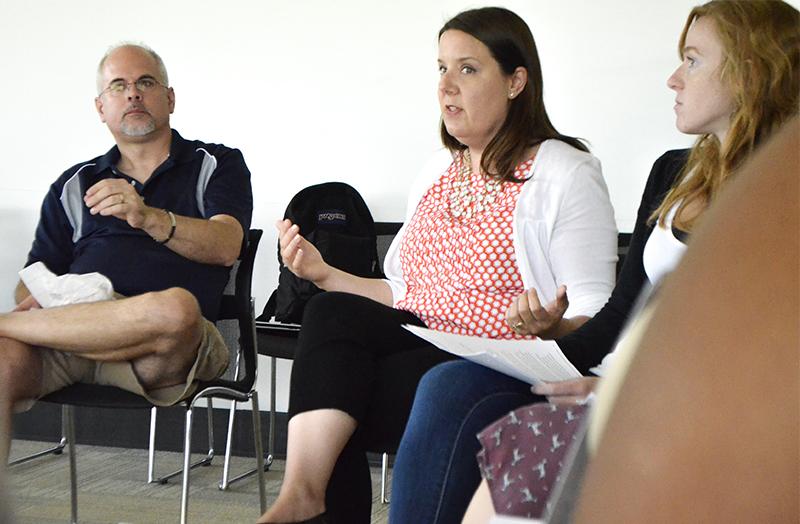Democracy Square drives national issue to NKU
Ann James (center) discusses with students and staff the process the university takes when a student files a sexual assault claim.
Democracy Square Live’s first event of the semester had students discussing the heightened national attention of sexual assaults on college campuses as well as ways NKU is handling it here at home.
The roundtable-style discussion, lead by Norse Violence Prevention Coordinator Gabby Molony and Associate Dean of Students and Title IX Coordinator Ann James, allowed students to address their concerns about their safety on campus.
“It’s been really out there,” James said about the growing subject.
James explained that NKU’s sexual misconduct policy covers four parts: nonconsensual sexual contact, sexual harassment, nonconsensual sexual intercourse and sexual exploitation. She said that students who feel like these things are happening to them should report them to the dean of students’ office.
“Students will say ‘I don’t know if what happened to me is actually against policy or against the law,’” James said. “We wanted to make it very specific because we wanted students to read the policy and say ‘okay, yes. That’s what happened to me.’”
Prior to the university’s adoption of the policy, James said that NKU had vague standards as to what counts as sexual assault. She added that the university is obligated to investigate any complaint they receive from students.
“Something that’s been in the news recently is students feeling as though the universities they’re attending aren’t investigating the complaints they’re filing,” James said.
After investigating, NKU would file a hearing to come up with a ruling for the case, according to James.
James also explained even that if a student files a report with the dean of students’ office they won’t be required to go to the police if they don’t want to. She added that she would encourage them to, but they don’t have to.
“If we know something, we have to act,” James said.
According to James, the police do have to be notified if a certain threshold in severity is crossed.
To help inform the campus community on what to do if they seen any kind of assault, NKU’s new Norse Violence Prevention center has adopted Green Dot as a way to train bystanders to intervene, according to Molony. She said that the training attempts to try and “create a culture at NKU where we take care of each other.”
Some of the students said that when out partying, they incorporate a buddy system, which is similar to how Green Dot works, according to Molony. The system encourages people to step in, or even delegate through getting help, if they see something wrong.
James said that students who approach NVP don’t have to file a report with NKU or the police, but Molony can provide students with support and resources. James added that Molony, being obligated under a piece of federal legislation known as the Clery Act, would have to file an anonymous report if the student didn’t want their identity revealed.
“Half the battle is getting people to talk about it,” James said.
The number of sexual assault cases on NKU reported under the Clery Act in the past year was in the single digits, according to James, but she said that she knows that number is wrong.
“Twice now we’ve sent out a survey to NKU students asking what their experience is and the numbers in those surveys are much, much higher,” James said. She added that barriers, such as victims being ashamed or not knowing where to go, exist that prevent more victims from reporting.
DSL is ran through Scripps Howard. Katie Crawford-Lackey, who coordinates the events, said that DSL is focusing on a series of issues that matter most to college students this semester.
“This is great,” Crawford-Lackey said about the turnout of the event. “Usually it’s hard for student to come out to lunch.”
Stay connected to The Northerner for a more in-depth look at this issue coming next week.


